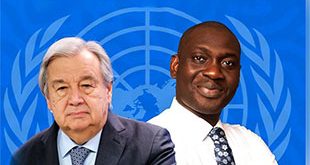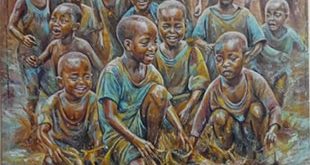
By Peter Nyanzi
FDC boss was sending a message about how he intends to approach 2016 elections
During the ongoing Parliamentary recess, Budadiri West MP Nandala Mafabi, also the Leader of Opposition in Parliament (LOP), has been making controversial statements while addressing rallies in his constituency. At one of the rallies at the end of December, he went on record saying his eye is set on launching his own political party under which he would contest for the presidency in 2021.
He went ahead to suggest that his Forum for Democratic Change (FDC) party boss Mugisha Muntu was “weak,” and cannot worry President Yoweri Museveni ahead of the 2016 elections. While that stance would be understandable given that the two men were rivals for the top FDC job, his earlier proposal that only MPs should contest for the presidency – an idea that Muntu publicly dismissed – could have been the last straw.

The acrimonious rubbing of shoulders between the two men always pointed to only one outcome – that Mafabi’s days as LOP were numbered.
It is a fact that Mafabi’s camp probably knew – that come the midway point when Committees of Parliament would change leadership, the LOP would top the list of those being shown the exit. The question, therefore, was not if but who would succeed Mafabi.
Muntu’s choice was not what most people were expecting. On Jan 31, numerous eyebrows were raised when Muntu told a group of his top party officials that WafulaOguttu, the party’s spokesman, would be the next LOP. Why then, people are asking, should Muntu leave seasoned politicians to go for a ‘novice’ who has been in Parliament for barely two years?
Prof. Mwambusya Ndebesa, a political analyst and history don at Makerere University, says it is a mistake for anyone to think that Oguttu is lacking in experience.
He says as a man who has been at the highest levels of media practice and management in Uganda, Oguttu probably has more experience in the style of politics Muntu likes than the so-called veteran politicians.
Oguttu formerly headed the Weekly Topic newspaper before launching The Monitor in 1995 and headed the influential paper until it was sold to The Nation Media Group in 2001. Since then, he has been politically active with the FDC in various capacities, which makes him ideologically sound. That, according to Ndebesa, gives Oguttu a lot of social capital, which is a competitive advantage against many of his colleagues in Parliament.
Breaking away from `Besigyeism’
For a man who is trying to break away from ‘Besigyeism,’ which as a political philosophy has on three occasions failed to unseat Museveni, Muntu is keen on entrenching a new culture driven by dialogue and organisation instead of outright militarism and eyeball to eyeball engagements with the security forces on the streets.
Mafabi is closer to Besigye having been picked by him in 2011. During Mafabi’s unsuccessful FDC presidential bid, it was an open secret that Besigye was backing Mafabi in a case of birds of the same feathers flocking together.
Unlike the fire-spitting Mafabi, Oguttu is more bent on handling issues in a manner that mirrors Muntu’s. For example in May 2012, a visibly irritable Mafabi shocked the country when he sacked UPC and DP MPs from the Shadow Cabinet and opposition activities over participation in EALA elections. Mafabi’s action, which was roundly criticised as arbitrary and unreasonable, was a response to open comments made by both UPC and DP whips to the effect that their candidates were dully nominated to stand for the EALA elections, a move that Mafabi saw as contrary to the “agreed position” that all opposition parties must boycott the elections. The row created a massive rift between FDC and other opposition political parties, a debacle that the FDC is yet to recover from fully.
Though lacking in charisma, observers say Oguttu is a man of equanimity with both emotional and relational intelligence and who is not only unlikely to make such a blunder. Instead, many expect him to apply a healing balm and help to lead the effort to mend fences.
Rumours have been rife that Mafabi is being pressurised by supporters from West Nile and the northern region to break away from FDC.
Some observers say the likely scenario is that Mafabi will quit FDC and join hands with KCCA Lord Mayor Elias Lukwago and Besigye to form another political party.
Muntu would be keen to ensure that his party is not affected by a schism that would weaken it further going into the next elections. That explains why he wants veteran politician Cecilia Ogwal and Dokolo Woman MP to be the Opposition Chief Whip.
Her experience, spanning almost two decades, would come in handy as a prop-up for the rather inexperienced Oguttu. She would help him deal with opposition veterans such as Alice Alaso, Abdu Katuntu and Odonga Otto among others, all of whom were also eyeing the top job.
But that is not all, in Cecilia Ogwal, Wafula also has a formidable ally, a politician who knows the workings of political parties and who has experience in networking, forging partnerships and resolving conflicts. Oguttu’s and Ogwal’s various skills would dovetail well to cope with the challenges going into the next election barely three years away.
Also, Ogwal is from northern Uganda while Oguttu is from the Eastern Uganda – two regions that have historically been bastions of the opposition for over two decades. The supporters in the two regions will surely not feel as if they have lost anything in losing Mafabi as LOP.
Good picks
Wafula was a good pick because he doesn’t come with too much political baggage to weigh him down. Mafabi had the Bugisu Cooperative Union baggage, which his foes used to undermine his role in Parliament.
Wafula, 62, can confidently say he has no political enemies – even members of rival parties would not mind working with him.
Reacting to news about his appointment, Oguttu admitted on his Facebook page that fitting into the “big shoes” of Prof. Ogenga Latigo and Mafabi would be a challenge.
“I now know that I am going in as an underdog,” he posted. “It is good that way for me.” He then reminisced of how a friend who told him in 1992 when they founded The Monitor newspaper that it would not last more than five months “because I did not possess what it takes to start and build a company worse still a newspaper.”
Instead, he added, the friend offered him a job which he “politely declined.” “The rest is history,” he concluded.
Thirdly, that Oguttu is loyal, hardworking, and disciplined is not debatable. In fact while explaining his choice of Oguttu, Muntu suggested that he is one of the most committed members of the FDC. He said if a meeting is called, Oguttu would be one of the first five people to turn up, every time. In fact in an interview early this week, Wafula revealed his humble and unassuming side when he said he argued with Muntu not to pick him for the job. Ndebesa says Wafula is amiable and coolheaded – qualities that rhyme well with the cavalier Muntu.
Other observers say Muntu also wants a clean-cut break from Besigye’s “militaristic approach” to dealing with issues because it has proved unsuccessful. So while Besigye is a ‘clenched-fist fire-spitting warrior’ who prefers taking on his perceived enemies on the frontline, Muntu’s political strategy is founded on negotiation and behind-the-scenes maneuvering. And having worked with President Museveni as army commander for almost a decade, Muntu knows better than anyone else that Besigye’s mad-bull style would never move a president who has made his mark by answering fire with fire.
Muntu is keen on trying a different strategy – one that Museveni is almost powerless to stop: strategic planning, building partnerships and mobilising support one voter at a time.
Obviously Muntu’s eye is not on storming State House come 2016; his plan is more long term. He knows that if he builds a good team of like-minded people, he could have a good say on what the next government will be like in 2021 or even earlier in case of a coalition government.
Some observers also think Muntu is a better prospect as Museveni’s successor than Besigye. This camp says if Museveni gets to trust people who would take over from him, he would be willing to make history by being the first Ugandan president to peacefully handover to an opposition rival.
But is the ruling NRM party happier now that Mafabi is out? Not necessarily, according to Mathias Mpuuga, the Masaka Municipality MP.
Mpuuga, who was elected as an Independent but is strongly aligned to the Democratic Party, says Museveni must be jubilating over the ouster of Mafabi because the President has “a personal vendetta” against Mafabi as a person for being a stumbling to his attempts to patronise the Bagisu.
He could however not say if or not the Opposition in Parliament would be weaker or stronger because of the new changes. He admitted that if there had been consultations, some of his colleagues would probably have offered other suggestions.
“But that does not matter, what matters now is on our ability as the Opposition to work as a team,” he said. “Politics is team sport.”
But Prof. Ndebesa says the NRM hierarchy must have mixed feelings about Oguttu’s appointment.
This is because Oguttu was previously a prominent member of the UPC, then UPM – President Museveni’s first party – and later NRM before crossing to FDC in the footsteps of Besigye and Muntu.
So, while the NRM could be happy because Mafabi is out, there has to be a pertinent worry that Oguttu could woo some of the party’s supporters to FDC. The heebie-jeebies will persist for sometime but the actual benefit of these changes will remain to be seen. What is also clear is that these recent changes presage a new focus and more changes at Najjanankumbi, the headquarters of Uganda’s largest political party ahead of the 2016 general elections.
 The Independent Uganda: You get the Truth we Pay the Price
The Independent Uganda: You get the Truth we Pay the Price




